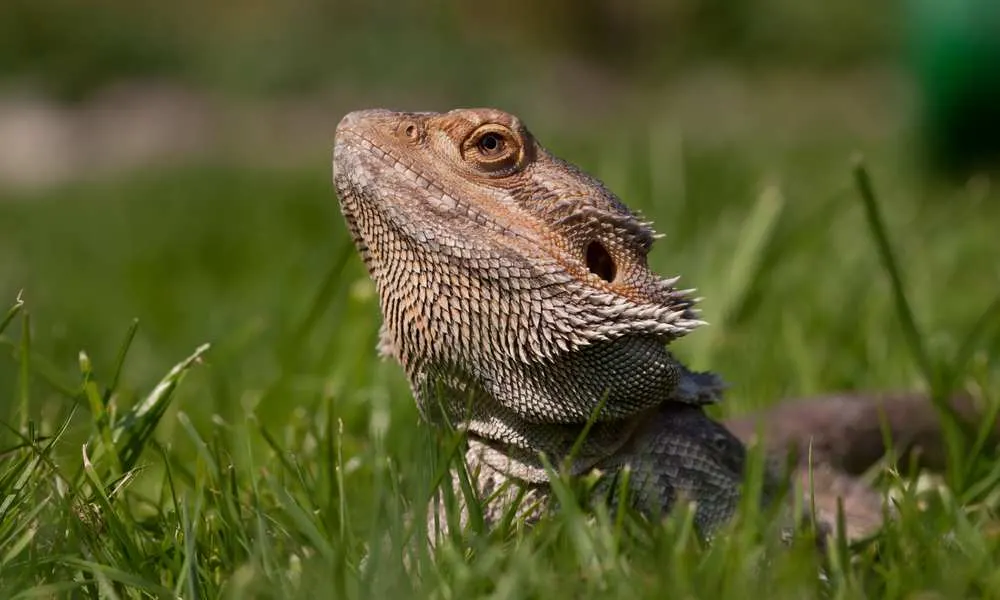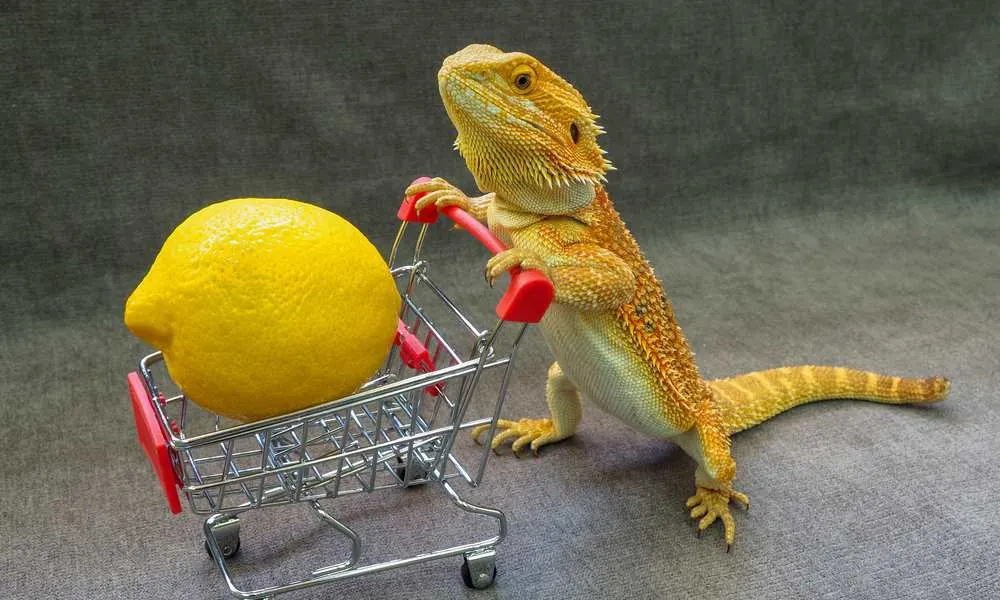Every bearded dragon owner is interested in what their pet can and can’t eat.
If you own a backyard and you let your beardie explore a bit every now and then, you might have seen him munch on some grass. So should you panic, or should you let your beardie channel its inner cow and start grazing?
We have all the answers right here.
Can Bearded Dragons Eat Grass?
Yes, they can, but so can we, and yet, we tend to keep it off our lunch menu. Just because bearded can eat grass doesn’t mean they should. In addition to that, grass that’s in your backyard can cause some severe health issues and shouldn’t be taken lightly.
Let’s get into a bit more detail as to why this is the case.

Why Bearded Dragons Shouldn’t Eat Grass?
There are quite a few reasons why beardies shouldn’t eat grass; we’ll cover the main three, which are, in our opinion, the most important.
Pesticides
Pesticides are a significant threat when it comes to letting your dragon eat grass. They’re highly toxic and can lead to some serious health issues.
Pesticides can not only kill amphibians like bearded dragons but can wreak havoc with their hormone production and regulation, which can affect their ability to reproduce and even disrupt their behavior.
According to a lot of manufacturers, pesticides break down relatively quickly. However, some pesticides remain in the environment for up to 7 years. They’re known as persistent pesticides.
If you bought a house with a backyard a few years ago and you don’t know if the previous owners used pesticides to maintain the lawn, don’t let your beardie munch on the grass; it’s not worth the risk.
Be extra vigilant if you go to a park or some other green public area. In order to maintain that lush green environment, pesticides, and insecticides are used heavily.
When returning home from such a road trip, give your beardie a good bath, just to make sure you get rid of any potential hazards.
Lack Of Nutritional Value
The grass is an umbrella term for quite a bit of different types of, well, grass. The grass that’s typically in our backyard doesn’t compare to wild grass that’s out in nature. The number of fibers, proteins, and vitamins is vastly different.
So if you were planning to save some money on your beardie and just put regular grass in his bowl, you might want to think twice before you do so.
An insufficient amount of healthy nutrients can lead to growth issues and even lethargy. You really don’t want that happening with your beardie.
Both young and adult bearded dragons need greens in their diet, but backyard grass isn’t the solution.
They’re Not Naturally Equipped For It
Some animals have been naturally equipped with a digestion system that can break down grass fiber and utilize its nutrients without any issues. Some of those animals are deers, goats, horses, cows, etc.
Reptiles are not part of that group. Although they can eat grass, it’s usually not their first choice since there are a lot better options out there that can’t cause them any harm.
Their digestive systems are much better suited to eating insects and proper vegetables and fruit.
We’ll cover some of those options later in the article.

Do Beardies Eat Grass In The Wild?
This ties into our previous two points.
Beardies do eat grass in the wild, but mostly when they’re out of other options. One of the ways they consume grass is by eating insects on the ground.
If the food sources are scarce, bearded dragons will start eating grass in order to survive. This is especially true for adult dragons who are much more herbivorous compared to their younger counterparts.
Although they prefer fruit and other greens, if they’re unable to find either of those, grass would suffice, at least for a while. Keep in mind though; they would be eating wild grass, which is wildly different compared to the one we have access to.
Not just in terms of pesticides and other artificial hazards, but the sheer amount of nutrients.

Do Baby Beard Dragons Eat Grass?
This is a very good question.
Although bearded dragons are considered omnivorous, baby dragons tend to be around 80% carnivorous. This is because they’re still growing and need as much protein as possible.
Baby beardies mostly concentrate on catching insects as much as they can. If some grass is stuck on the insect, they certainly won’t mind.
So if you see your beardie munching on it, don’t worry, it really shouldn’t be a problem. However, don’t let your beardie eat too much grass as it can be detrimental.

What If They Eat Too Much Grass?
This can be dangerous.
Firstly, if they eat too much grass, the excess amount of fiber might cause some gastrointestinal issues, one of which is constipation. Constipation can be fatal to reptiles, and you want to avoid it at all costs.
If you think your bearded dragon might be suffering from any kind of digestive or stomach issue, taking it to a vet as soon as possible is highly recommended.
But there are other, less dire consequences of eating too much grass. If your beardie fills up on grass, it probably won’t have the appetite to eat food that is actually relevant to its health.
So if you let your bearded dragon outside make sure you monitor his behavior and stop it from doing anything it’s not supposed to.

Healthy Alternatives
The best way to make sure your bearded dragon is properly fed and remains healthy is to feed it food that it would eat in its natural habitat.
This is especially true when they’re young. Sure, it might look fun to give your beardie peppers, but they won’t necessarily contribute that much to its growth.
Young beardies need quite a bit of protein. Feeding them insects like crickets, cockroaches, grasshoppers are the best way to ensure they receive that necessary protein and grow up happy and healthy.
Please don’t feed them insects that you catch in your backyard, as those can also be full of pesticides or insecticides and can certainly poison your pet.
Go to a pet store and buy insects that are free of any insecticides. Once your beardie stops growing, half of its diet should be plant-based.
Vegetables such as:
These are all great sources of vitamins, necessary for maintaining beardies’ health.
As for fruit:
These are just some of the options you have regarding fruit.
Again, keep in mind, younger beardies need more animal-based food in their diet compared to adult beard dragons. If you can afford it, buy organic, if not, just properly wash fruit or vegetable before giving them to your pet.
To make it easier for you to know what are some foods that are good both for an adult and baby bearded dragon we’ve given you a quick table if you’re ever in a pinch.
| Food | Baby Dragons | Adult Dragons |
|---|---|---|
| Acorn squash | Occassionaly | Daily |
| Crickets | Daily | Daily |
| Butternut squash | Occassionaly | Daily |
| Turnip greens | Daily | Daily |

Conclusion
We’ve given you quite a thorough explanation as to why your bearded dragon shouldn’t eat grass.
A small amount now and then shouldn’t hurt; after all, they’re not that sensitive. However, if you have a tendency to let your beardie roam around the yard every now and then, make sure there aren’t any pesticides or insecticides that can hurt the little fella.
If you don’t want your bearded dragon eating grass, make sure it has a rich diet full of vitamins, proteins, and minerals essential for its health. This will ensure your bearded dragon isn’t hungry and doesn’t need to compensate for lack of any nutrients by munching on grass.
That is pretty much it, next time you let your bearded dragon outside, you have all the necessary information you need to keep your pet nice and safe.
Learn More: What Can Bearded Dragons Eat? 101 Food List


